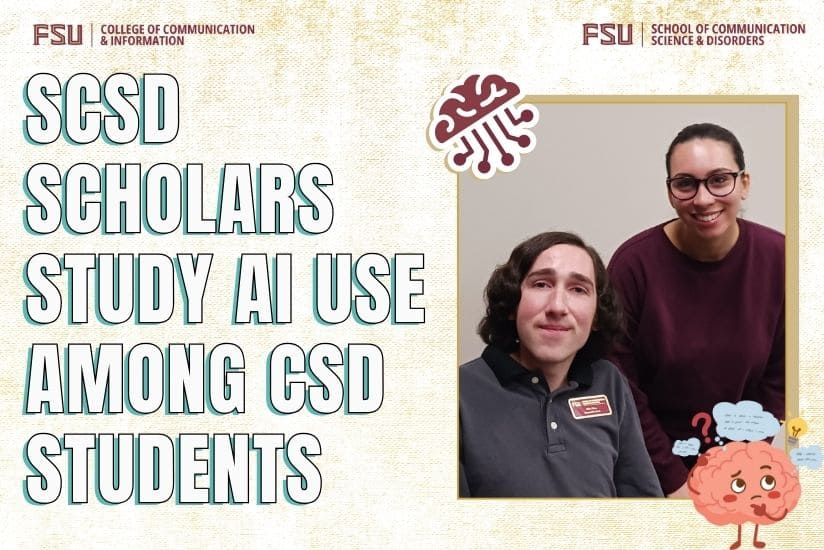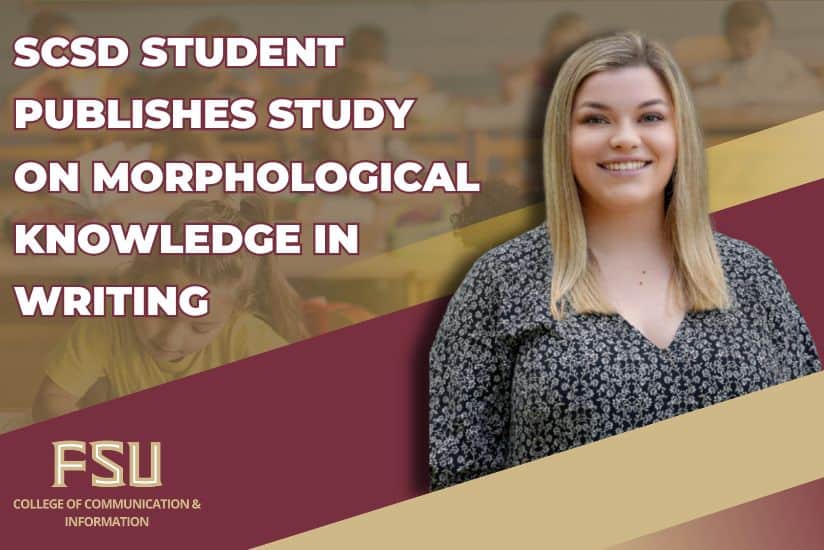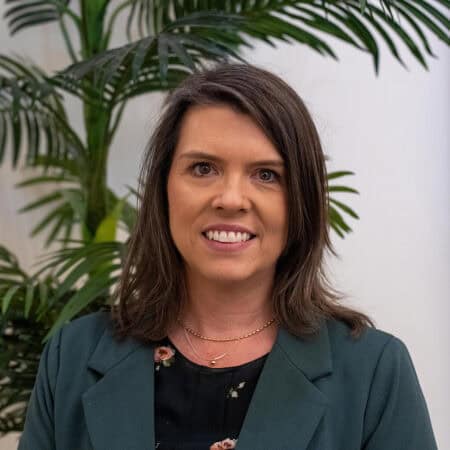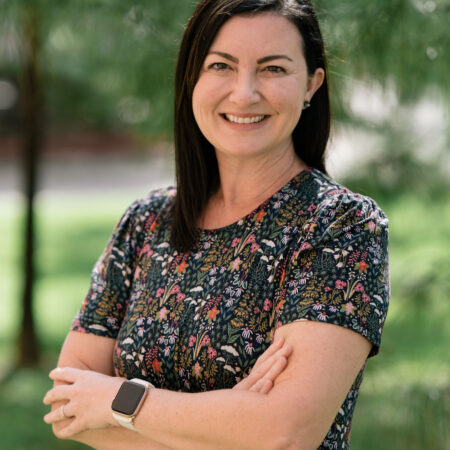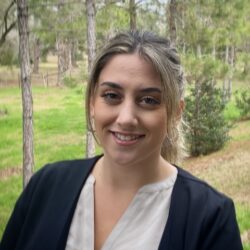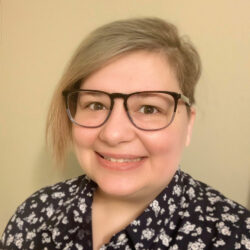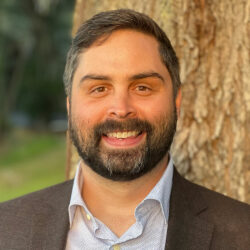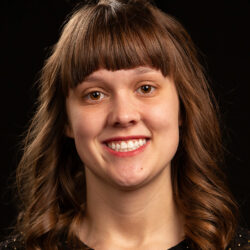Program Information
College: Communication & Information
Degree: P.h.D
Limited Access: Yes
Contact: Jennifer Kekelis
Address:
201 W. Bloxham,
Warren Building
Tallahassee, FL 32306-1200
Phone: (850) 644-2253
Email: FSUComDis@cci.fsu.edu
LEAD THE FIELD OF CSD
The doctoral program is designed to prepare researchers, teachers, and scholars in the field of Communication Science and Disorders to conduct clinical research and work in leadership roles within academic positions at universities, research institutes, state and national agencies and organizations, and clinical settings.

Elizabeth Madden
"I am interested in work with individuals with aphasia to help them regain some of their language skills that had been affected by a stroke."
Assistant Professor, School of Communication Science & Disorders
Related News
Program's Overview
Doctoral students are able to specialize their education with respect to their specific interests. A unique feature of the program is the emphasis of the faculty in applied clinical research in the following specialization areas:
Developmental Disabilities
- School-age language and literacy
- Autism spectrum disorders
- Infants and Toddlers
- Early Identification
- Early Intervention (Routines-Based, Shared Book Reading, Social Skills)
Neurologically-based Communication and Cognitive Disorders
- AAC
- Dementia
- Neurolinguistics
- Dysphagia
Speech, Voice, and Fluency across the Life Span
Request Information
Program's Courses
The doctoral program in Communication Science and Disorders is individualized to meet the student’s needs and interests based on his/her career goals. The student must demonstrate knowledge beyond the master’s level in three areas:
- Research Methods (fifteen semester hours)
- Communication Processes in Normal and/or Disordered Populations (nine semester hours)
- A Related Specialization area (twelve semester hours).
Students must also meet three additional requirements:- The student must demonstrate teaching competencies by taking major responsibility for teaching at least one undergraduate lecture course. The student must enroll in three to five semester hours of SPA 5940, Supervised Teaching.
- The student must demonstrate research competencies by participating in different roles in ongoing research of the major professor or more advanced doctoral students and taking major responsibility for initiating a research project. The student must enroll in three to five semester hours of SPA 5910, Supervised Research.
- The student must enroll in the departmental Doctoral Research Colloquium and Doctoral Seminar on Teaching and Supervision (SPA 6804; both are variable credit ranging from zero to three semester hours, repeatable to twelve hours) for a minimum of two semester hours each during the Fall and Spring semesters totaling four semesters over the first two years in the program and before advancing to candidacy.
Classes offered to the doctoral students include:
SPA 6140r. Seminar in Experimental Phonetics (1–3). This course examines phonetics experimentation through review of relevant journal articles and participation in speech recording, measurements, and analysis. The focus is on one of the three phonetic areas: physiologic, acoustic or perceptual. May be repeated to a maximum of nine semester hours.
SPA 6231r. Seminar in Neuropathologies (1–3). May be repeated from term to term to a maximum of nine semester hours.
SPA 6434r. Seminar on Developmental Disabilities (1–3). This course provides advanced graduate students with an opportunity to study and analyze current issues affecting children with developmental disabilities, including the families of these children and their communities. Students examine cross-disciplinary contributions to developmental disabilities research, service, and policies. May be repeated to a maximum of nine semester hours.
SPA 6804r. University Academic and Clinical Teaching Colloquium (0-2). (S/U grade only). This course is designed to provide doctoral students with information and essential skills for teaching in the university environment. May be repeated to a maximum of twelve semester hours.
SPA 6805r. Seminar in Clinical Research Methods (3). This course advances students’ knowledge of research methods used to study clinical problems and to evaluate intervention techniques used in speech-language pathology and other educational endeavors. Current research literature is examined to critique the research methods used to address specific issues selected by students. May be repeated to a maximum of nine semester hours.
SPA 6825r. Seminar in Speech Pathology (1–3). This course is an advanced study of communication disorders, including review of literature and critique of research methodology. May be repeated from term to term, to a maximum of nine semester hours.
SPA 6841r. Seminar in Language (1–3). May be repeated from term to term, to a maximum of nine semester hours.
SPA 6900r. Readings for the Preliminary Examination (1–6). (S/U grade only). Prerequisites: Doctoral standing and department approval. This course is to be taken prior to or during the semester the student registers for the preliminary examination. May be repeated to a maximum of six semester hours.
SPA 6930r. Seminar in Special Topics (1–3). This course content varies as faculty offers different issues and special topics concerning the discipline. May be repeated from term to term to a maximum of nine semester hours. Students may enroll in more than one section during the same semester.
SPA 6980r. Dissertation (1–12). (S/U grade only).
SPA 8964r. Preliminary Doctoral Examination (0). (P/F grade only.)
SPA 8967r. Advanced Master’s Comprehensive Examination (0). (P/F grade only.)
SPA 8976. Master’s Thesis Defense (0). (P/F grade only.)
SPA 8977r. Advanced Master’s Thesis Defense (0). (P/F grade only.)
SPA 8985. Dissertation Defense (0). (P/F grade only.)
Admissions
It is the student’s responsibility to know all the rules, requirements, and regulations of the Doctoral Program in Communication Science and Disorders and the Graduate School of the Florida State University.
Eligibility Requirements
The following minimum requirements must be met in order to submit an application, but meeting them does not guarantee admission:
- A baccalaureate degree (master’s for advanced master’s applicants) from an accredited college/university.
- An upper-division cumulative grade point average of at least 3.0 (on a 4.0 scale).
- A recommended minimum GRE scores of: Verbal—150, Quantitative—150, Writing—4.0.
Doctoral Program Admissions Process
Admission to the Doctoral Program is contingent upon meeting The Florida State University policy on admission for the advanced degree. Academic standards, residence, transfer credits, and time limits are in accordance with regulations of the University.
Deadline: Jan. 1 for priority funding for fall semester, otherwise, applications will be accepted until March 1st.
All application materials including transcripts and test scores must be submitted by the School of Communication Science and Disorders application deadline. We cannot guarantee your application will be reviewed if we do not have all documents and test scores. These documents must be uploaded to the University Online Application.
1) Start the Graduate Application Portal process.
2) The following supporting documents must be submitted to the online application:
- Resume or Curriculum Vitae
- Purpose Statement: Be sure to state clear research objectives and provide information on faculty you would be interested in working with.
- Three Letters of Recommendation (academic references strongly encouraged): Names and addresses of your recommenders should be entered in the appropriate section of the University Application. You should have already contacted your recommenders about writing letters on your behalf. Each of your recommendation providers must fill out an online recommendation form and upload a copy of the recommendation letter to the online application. Please Do NOT send letters to the School or agree to relay your own letters of recommendation.
3) The following supporting documents must be sent separately and cannot be uploaded to the online application:
- One copy of all official transcripts sent to the Office of Admissions.
- Official GRE scores
- Recommended minimum scores: Verbal—150, Quantitative—150, Writing—4.0.
- Test scores must be from within 5 years of the time of application.
- International applicants: TOEFL scores are required for students whose native language is not English.
- Recommended minimum scores: Internet-based—80, Paper-based—550.
- Test scores must be from within 5 years of the time of application.
- All test scores should be sent from ETS electronically to the Office of Admissions using FSU School code 5219.
- We recommend that you allow at least 4-6 weeks for FSU to process score reports once they have been sent.
The address for submitting transcripts is:
The Florida State University
Office of Admissions
282 Champions Way
P.O. Box 3062400
Tallahassee, FL 32306-2400
USA
4) Once the application is completed, you will be directed to pay the $30 non-refundable application fee.
5) Once you have applied, you can check the status of your transcripts and GRE scores by logging back into the graduate application portal. Note: Please email the School at FSUComDis@cci.fsu.edu to check the status of your letters of recommendation and/or statement of intent since these items may not show up through the status check.
Program's Faculty
Hall-Mills, Shannon
Associate Professor; Graduate Program Coordinator (TLH Campus)
Lansford, Kaitlin
Professor and Associate Dean for Research and Creative Activities
Montgomery, Tricia
Teaching III Faculty, Director of Clinical Education & Director - FSU Speech & Hearing Cli
Morris, Richard
Professor, Associate Dean for Academic Affairs and Faculty Advancement
Nimmons, Ellen M.
Teaching Faculty III, Clinical Faculty Instructor
Snowden, Selena
Teaching Faculty III, Director of Audiology Services


